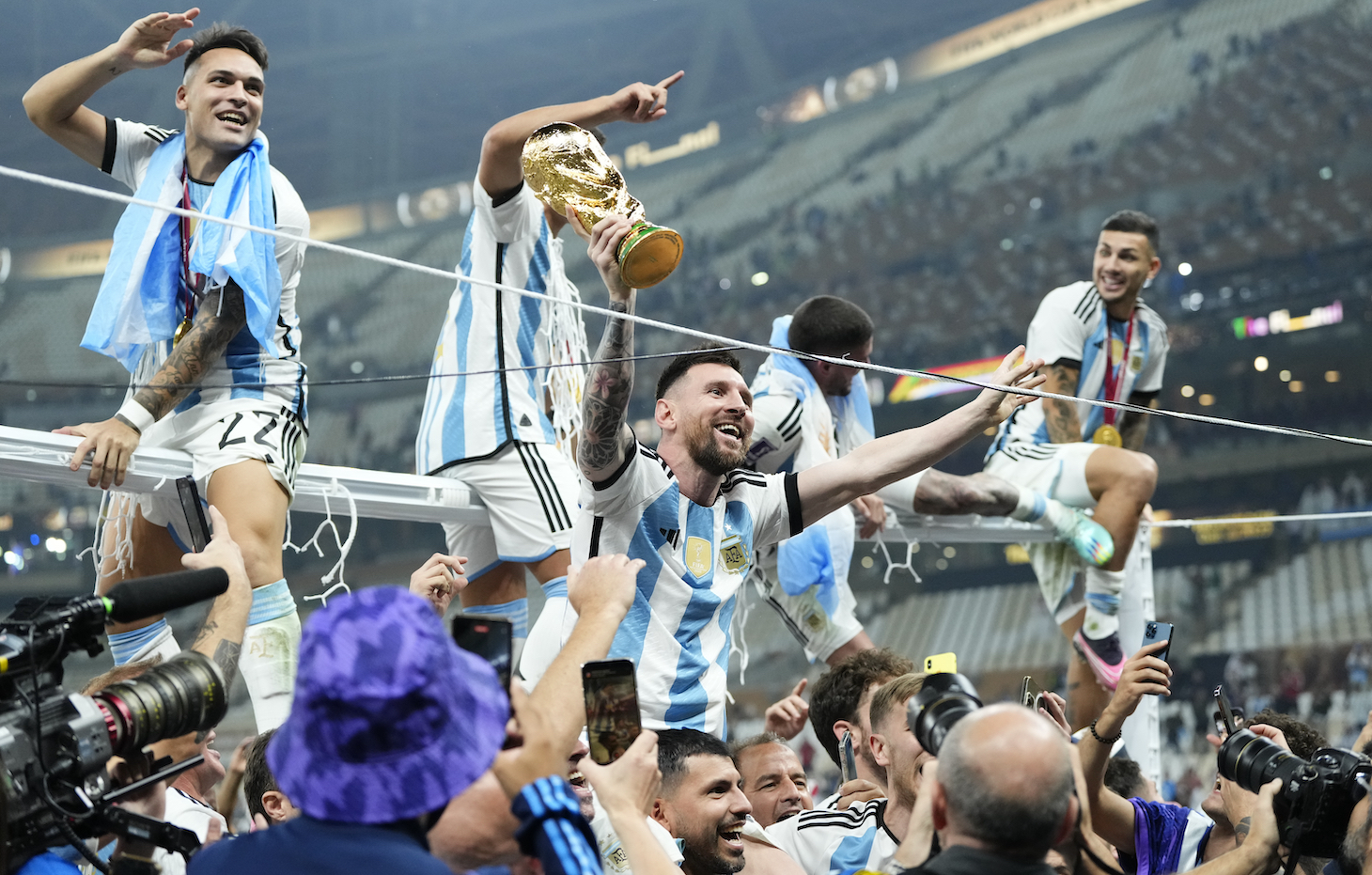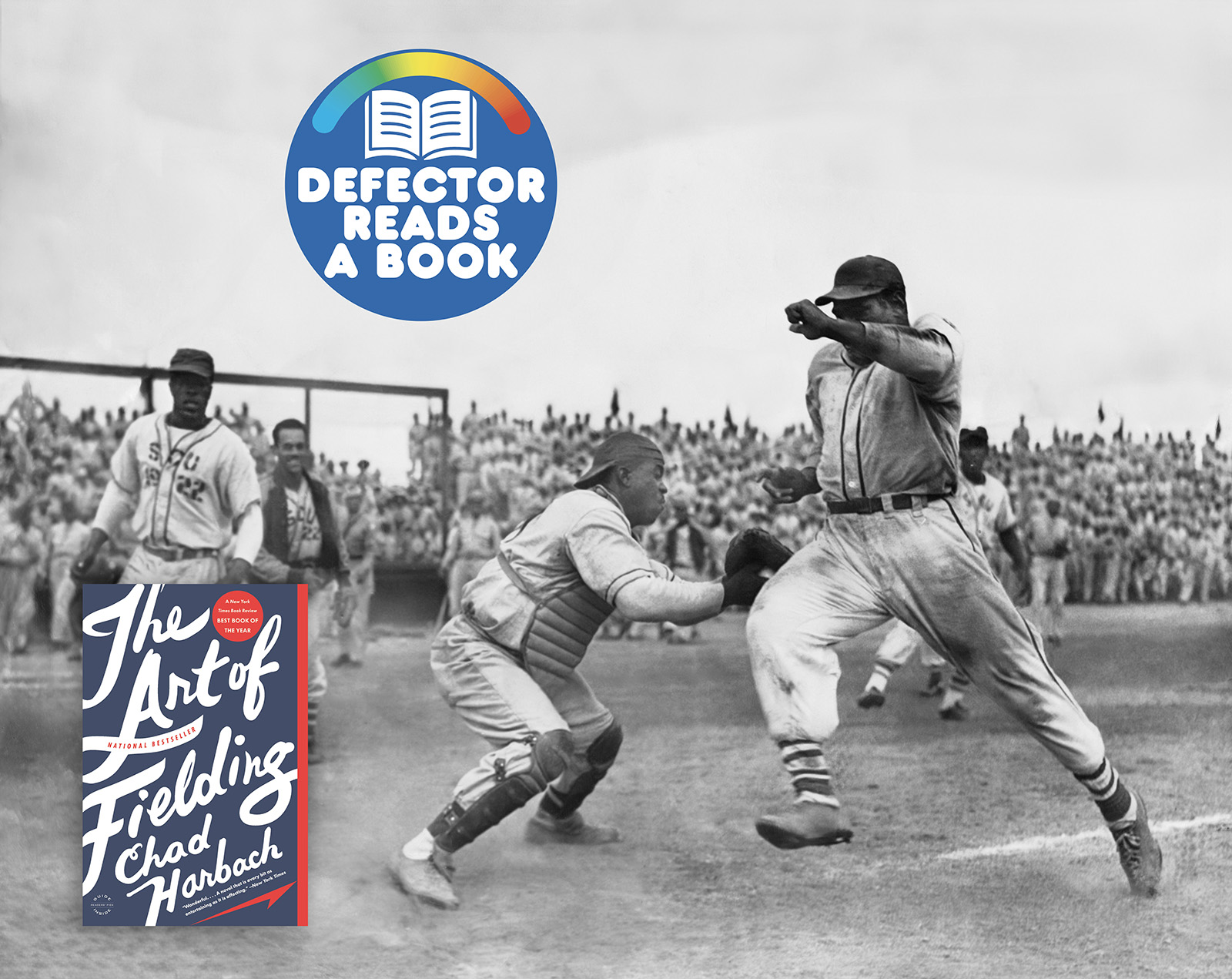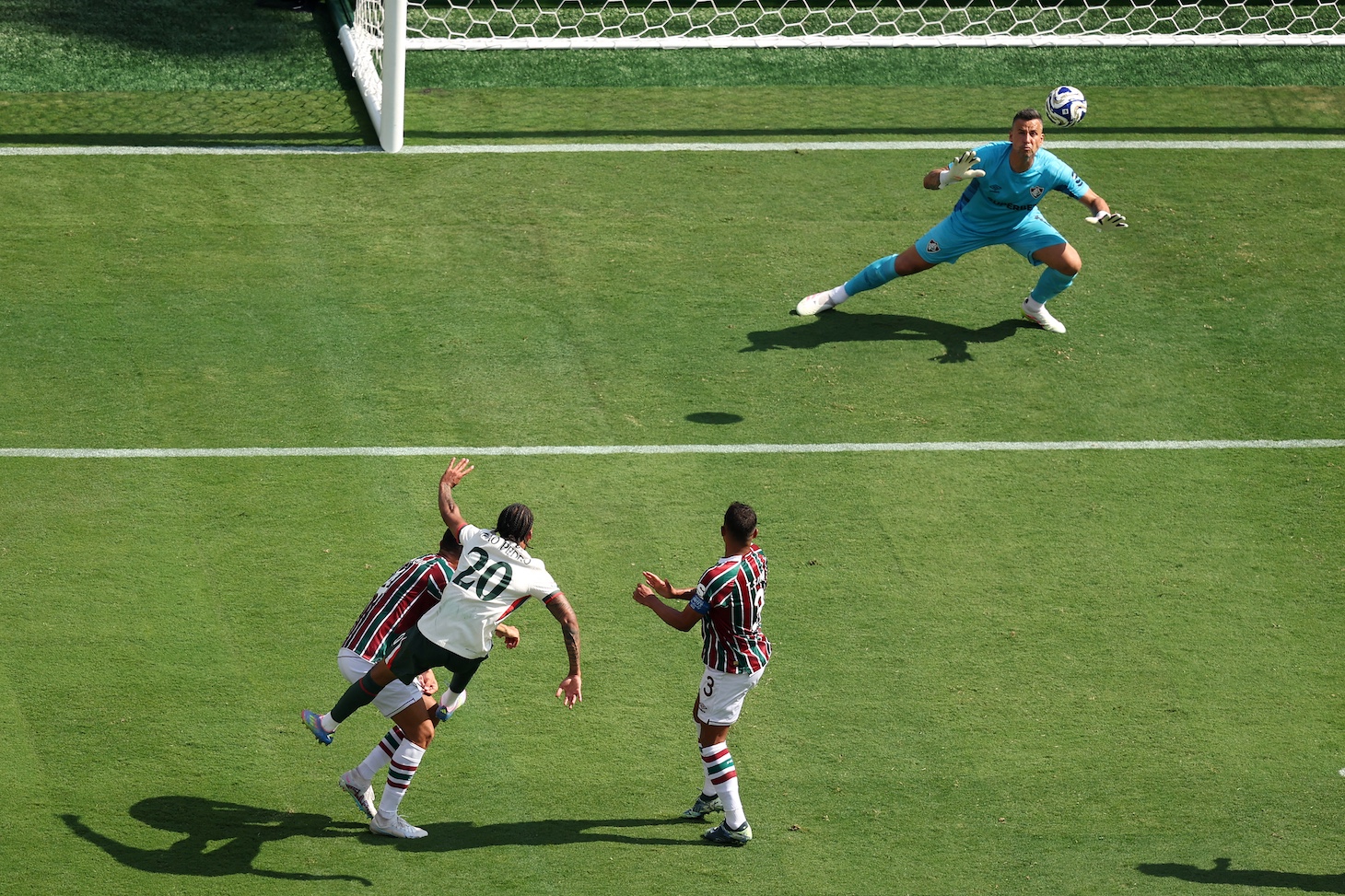It's clear that the World Cup means a lot. My favorite example of the tournament's unique meaning from the edition that just ended came early on in the proceedings. Up 1–0 on Saudi Arabia deep into the teams' second match of the group stage, Poland's Robert Lewandowski happened upon a misplayed back pass. This gifted the Pole a golden opportunity to score the simplest of goals and seal the victory. As expected from this titan of the game, a man who's spent a decade and a half at the sport's highest echelon scoring hundreds of goals and winning some two dozen trophies along the way, Lewandowski beat Saudi Arabia's keeper. In response to this utterly routine strike, the 34-year-old managed to run just a few yards before diving to the grass and sobbing in bliss. It may have only been a tap-in, but it was his first ever goal in the World Cup, and it clearly meant the world to him.
🔥 ¡LEWANDOWSKI! ¡LEWANDOWSKI! ¡LEWANDOWSKI! 🔥
— Telemundo Deportes (@TelemundoSports) November 26, 2022
🫡 ¡El goleador polaco apareció! Marca su primer gol en @FIFAWorldCup y aumenta la ventaja para Polonia 🇵🇱#POL 2-0 #KSA#ElMundialLoEsTodo #POLvsKSA pic.twitter.com/3CudJJBRvY
As clear as it is that the World Cup means so much, it is just as obvious why this is so. The tournament is the biggest and most storied competition in the world's most popular sport. As a competition between national teams, it assumes a level of importance, galvanization, and excitement that no club competition can match. The trophy is punishingly difficult to win; a single mistake in what are at most seven games could spell the end. And the chance to win it only comes once every four years. If you are extraordinarily good and remarkably lucky, you'll get to play in it a maximum of five times.
But though it is clear that and why the World Cup means a lot, it is not quite so obvious what exactly the World Cup means. Does it mean everything—as in, is it the sole and supreme measure of a team's, a player's, a coach's, a country's soccer merit, the final word on success and failure and legacy? Does it mean nothing—is it an entertaining but more or less random competition that is loads of fun but shouldn't be freighted with such vague but burdensome Meaning? And if it is neither extreme, then what are the terms and stakes of this middle ground? For instance: Is Lionel Messi now definitively the greatest soccer player of all time because he won it? Would he definitively not be the GOAT had Emi Martínez's foot not gotten to Randal Kolo Muani's extra time would-be winner? Would it not have mattered either way? Was Kylian Mbappé's own potential GOAThood helped or hurt by Sunday's loss, and in what way?
There are no simple answers to what the World Cup does or doesn't mean, nor to related questions like to whom it can or should mean whatever it means, and who gets to decide it all. But I believe that the place to find this meaning where meaning is always found: in story.
As Pier Paolo Pasolini put it in a brilliant essay on the sport, soccer is a language. Just as painting, cinema, and fashion all comprise their own systems of signs, no less analogous to written language for being non-verbal, so does soccer. The "letters" of this language consist of the 22 individual players on the pitch. Players form "words" through the infinite combination of these letters as the players move about in conjunction with one another, passing, dribbling, shooting, defending, etc., fully intending to communicate to one another as they seek to achieve their goal. Soccer's rulebook provides the syntactical rules that govern the language's terms and keep them consistent. These letters, words, and rules combine to form a larger discourse that makes up a match, and the spectator's task is to follow this ongoing conversation and interpret what is happening, why it is happening, and what it means.
If soccer is indeed a language and not, say, a math equation, and if the task of following soccer is learning to read this language, then we necessarily come to the realm of hermeneutics, the discipline of interpreting signs and symbols. And if soccer is a language, then it stands to reason that the hermeneutic that would best apply to the interpretation of soccer is that of interpreting narratives.
This makes intuitive sense. The game of soccer may be entertaining once you've stuck with it long enough to learn what to look for out on the pitch, but its primary appeal isn't as entertainment. What makes soccer what it is is its emotional pull, found in its ability to tell the grandest, most compelling, least predictable, most emotionally stirring stories in the world. Players bring their life paths, their individual trials and tribulations, and their cultural backgrounds that inform the way they play; teams bring their long histories, their faded glories and heartaches, and their present and future aspirations; coaches bring their playing philosophies and interpersonal skills; fans bring their passions and preferences; together, they form the narrative building blocks, and this weird game, where 20 people who can't use their hands and two who can run around a giant field kicking a ball between one another and every now and then getting it into one of the nets, the game takes all of it and shakes it up and somehow produces some of the most beautiful images and stories the world has ever seen.
What is Lionel Messi's playing career if not a story well told? The beats of this story are well known by now: the childhood in Argentina, the precocious talent, the search for a team that would pay for needed medical treatment, the teenaged relocation to Barcelona, the rapid rise to global stardom, the unparalleled club success, the goals and trophies and accolades, the looming shadow of Diego Maradona, the odd ambivalence from his countrymen back in Argentina, the procession of heartbreaks with Argentina, the exile from Barcelona, the long-awaited redemption with Argentina, and now, after Sunday's victory, the World Cup denouement that heals all the old wounds and elevates the previous triumphs and reveals that the story that has gripped the world for almost two decades now was ultimately a comedy, not a tragedy. What could a World Cup, a player's career, or the sport as a whole even conceivably mean if not as a story?
The world of language, of story, is what connects people to ideas, ideals, consciousness, emotions, history, memory, art, religion, relationships—all things that are at the core to what it means to be alive. What those mean to any given individual is for them to discover and decide for themselves. But soccer is no less than life itself—it was invented by people, is played by people, and is interpreted by people—and as such its meaning is found where life's meaning resides, which is the world of story.
This, then, is the story I have come to tell myself about the 2022 World Cup final. The match was a contest between two opposing forces: the dreamers vs. the dream-killers. The Argentines were the dreamers. At stake for them was the fulfillment of a story so magical, so narratively perfect, that it could only be likened to a fantasy: after several thwarted attempts, one of the greatest players in the history of the sport had one last chance to grab the trophy his talent so richly deserved, filling the last, biggest hole in an otherwise fulsome career. With Argentina's crucial victory at the previous Copa América, Messi and his teammates shed all the fears and insecurities they'd carried with them for so long, and could finally dream this dream full-heartedly, without worrying that at any moment it might transform into a nightmare.
On the other side were the dream-killers. The power of Messi's story was so all-encompassing that even from France's perspective, the Messi angle overwhelmed theirs. This is in part because France had just won the World Cup four years ago. I'm certain every member of the France squad dreamed of winning this one, too, of making history as only the third country in history to win two consecutive World Cups. But I also have to believe that the urgency and motivation to achieve this repeat mission could not compare to the urgency and motivation the Argentines felt to write one of the best stories in soccer history. Can you really dream of becoming a dream-killer? You can, but it takes a certain personality to do so. And from interpreting the direction of the game as it happened, it seemed like only one French player really had the personality for it.
As a viewer, it was actively disorienting watching the first hour or so of Sunday's final. France was bizarrely passive. From kickoff Argentina was in total control of the match, so much so that it seemed like they were the only ones who wanted to win it. Argentina scored the first goal in the 23rd minute, and it changed nothing for France. Argentina got a second in the 36th, and France still didn't wake up. France manager Didier Deschamps took the drastic move of substituting two players before the halftime break—just about the loudest message a coach can send that something is seriously wrong—and even that didn't change things much. For a solid hour-plus of play, it seemed to me as if the bulk of the French players had stepped onto the pitch, immediately realized it wasn't going to be their day, and were basically content to whittle away the minutes in a loss that wouldn't hurt as much as it might had the country not achieved total victory just four years ago, willingly playing the fall guys in Argentina's and Messi's story.
The one Frenchman who very clearly did not want to go down as a mere footnote in the story of Messi's greatest triumph was Kylian Mbappé. Even when France was sleepwalking through the game, you could see in Mbappé's play and body language an icy determination to get back into it, and a total self-belief that he could and even would get the chance to do so. If there was a Frenchman on the field who dreamed of being a dream-killer, it was him.
Though the designation of dream-killer sounds negative, it's not meant to. It's actually one of the most awe-inspiring parts of true athletic greatness. There is an incredible selfishness found in almost all of the very best athletes in any sport, the ones who hoard the trophies and records and individual awards, that makes them just as driven to stay on top as they were to get on top, that makes them say that what's more important than the opponent's lifelong dream of first-time success is their own insatiable hunger to win and to win again and again and again. If Messi's story, coupled with France's own recent success, meant the majority of France's players were OK with losing Sunday's final, then it was the exact opposite for Mbappé. The excuses that could've forgiven the loss were to him the very things that fueled his desire to win.
It makes sense that Mbappé alone would feel this way. I imagine that he sees himself as in the opening chapters of his own legend, a story that potentially could even eclipse Messi's by the end. Victory on Sunday would've given Mbappé two World Cup titles at just 23 years of age. Had France won, his performance would've almost certainly gone down as the single greatest individual effort the tournament had ever seen, a man who almost by himself dragged a team from near-death to victory with a hat trick in the best match in soccer history. What could've been the coronation for one consensus soccer GOAT would've instead become a towering argument for the burgeoning GOAThood of Mbappé. Just as defeat didn't really threaten to harm any Frenchman's legacy or story, only Mbappé himself stood to gain so much from a potential French victory. Mbappé was the only one with the determination to try to tell a story as great as Messi's, and he damn near made it happen.
Ultimately, though, the game followed a different script. Messi answered each of Mbappé's heroics with a feat of his own, and his Argentine teammates, bursting with desire to share in Messi's dream and realize their own, outplayed their French counterparts. Argentina won on penalties, and Messi's story got the incredible climax for which he'd worked so hard and suffered so much. For his part, Messi never seemed in any doubt, which is itself remarkable. "I knew God would bring this gift to me," Messi said in the postgame interview. "I had the feeling that this was the one." In his own story, Messi believed he was fated to win, which had to have helped calm his nerves when Mbappé was doing everything in his power to bend destiny in his favor. Though we've seen emotion come pouring from his eyes before, Messi never cried on the pitch after the win. He'd already shed everything that needed shedding, and was in the moment simply full.
It often feels that the time for thinking about sports this way has passed. The drive towards more analytical interpretations, attempts to recast sports as more of a math problem than a story, was begun in earnest by people who found narrative interpretations limiting or opaque. It's hard to come to that conclusion when you watch the World Cup, though, which is another thing that makes it such a singular sporting event. When you see someone like Robert Lewandowski shed tears over a tap-in, or Ángel Di María weep in alternating joy and agony while sitting on the bench, or Andrés Cantor's voice crack into a million joyful pieces, you are seeing people be swept up by the story. In these moments, the narrative does not put limits on our understanding of sports, but instead opens up a universe of possibilities. We shouldn't abandon this mode of interpretation just because it has been done poorly in the past. Indeed, that's the very point of the hermeneutical process: we return to the tools and stories—to the languages—that have been handed down to us, adjust them enough to make them our own, and in doing so expand our horizons of thought and feeling.
My interpretation of the World Cup final is mine alone, and there are as many different ones as there are fans who watched. What the game meant to me isn't necessarily what it meant to you, nor what it meant to Messi or Mbappé or anyone else. The interpretive act is a personal one, and each interpreter brings their own experiences, biases, tastes, knowledge, history, and so on, all of which informs what something means to them. The test is only that a given interpretation ring true to the interpreter, that there's something about it that helps elucidates the truth of the events or story in question, so that you come away with a better understanding of it and, hopefully, of the world and yourself. Soccer is a language, and language has no limits, only uses.







